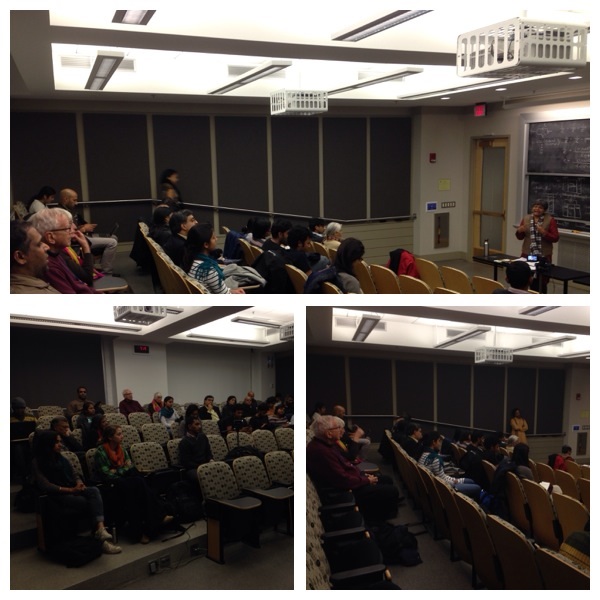Contribute
| Social Rights Activist Kavita Srivastava Advocates Space For Dissent In A Democracy |
Vanya Mehta, Kaushik Ragunathan and Urmitapa Dutta
11/21/2013
On November 14 2013, human rights activist and National Secretary of the People’s Union for Civil Liberties (PUCL) Kavita Srivastava spoke at an event titled “Silencing and Criminalizing Dissent: Challenges faced by the human rights movement in India†hosted by AID Boston and the Alliance for a Secular and Democratic South Asia. The People’s Union for Civil Liberties, of which Srivastava is National Secretary, was founded in reaction to the 1975 Emergency enacted by Indira Gandhi.
Speaking to a crowd of around 25 people in a classroom at MIT, Srivastava passionately enumerated the greatest struggles facing activists and the most marginalized people in India today. Citing stories of numerous personal friends and peers, she vehemently criticized the Indian government’s jailing of human rights activists. In particular, she talked about the ease with which the Indian government can assign a seditious claim on a law abiding citizen engaging in policy critique.
Voices of dissent that face persecution in India range from ordinary people fighting for their rights to persecution to Muslim, Dalit and Tribal communities. She traces this mindset of the Indian state to sedition laws enshrined in the Indian constitution. The Indian Penal Code reserves a section 124a on sedition that dates back to 1860 during the time of colonial rule which states that “whoever by words, either spoken or written, or by signs, or by visible representation, or otherwise, brings or attempts to bring into hatred or contempt, or excites or attempts to excite disaffection towards the Government established by law in India, shall be punished with imprisonment for life, to which fine may be added, or with imprisonment which may extend to three years, to which fine may be added, or with fine.†She emphasized the unconstitutional character of the law, asserting that a complete removal of this section is the only solution to systematic wrongful imprisonments.
Srivastava also alluded to how the archaic sedition laws have more broadly paved the way for other draconian measures in recent times. Examples include Terrorist and Disruptive Activities Prevention Act (TADA), Prevention of Terrorism Act (POTA), the Unlawful Activities Prevention Act (UAPA), and the Armed Forces Special Powers Act (AFSPA), which together provide the government with arsenal to hold dissenters under custody with little in the way of evidence. As a consequence, ‘guilt by association’ appears to be a sufficient criterion for assigning criminal charges. Srivastava cited several cases to illustrate the phenomenon. The case of Soni Sori, an Adivasi school teacher who was suspected of aiding Maoists presents a classic example of how these laws asymmetrically affect marginalized communities. In the course of their work in Rajasthan, PUCL found that of the 249 cases filed under the Terrorist and Disruptive Activities Prevention Act (TADA), 248 were against Muslims and 1 against a Sikh. The bias, Srivastava pointed out, is “blatant.†At times, very minimal actions that may be construed as seditious, according to Srivastava, are enough for the Indian government to peg and track people. “If you talk to a government official, it is considered interfering or obstructing with government processes,†she said, naming one of the many false claims placed on activists.
Srivastava decried the lack of political party activism as one of the biggest impediments faced by human rights activists in India. She also pointed out the nexus between the executive and legislative branches and how the judiciary, although imperfect, offers the only avenue for redress. Very few politicians or political parties are willing to take a stand on the subject. The near complete silence of diverse national and regional political parties on the issue of civil liberties point to a political collusion, which effectively obliterates spaces for registering dissent.
Ultimately, the goal for Srivastava and many other human rights activists in PUCL is to voice the needs of the marginalized and push politicians and judges to bring power back into the hands of the people. Srivastava concluded her talk with an observation she made in the course of her trip to the United States. She pointed out the homogenous character of most organizations she interacted with on the trip. She emphasized the need for social development organizations to make concerted efforts to be more inclusive of diverse issues, classes, religions and regions.
You may also access this article through our web-site http://www.lokvani.com/
